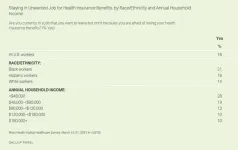Many consumers misinterpret food date labels, yet use them with confidence
Consumer education is needed to increase understanding of food date labels according to a new study in the Journal of Nutrition Education and Behavior
2021-05-06
(Press-News.org) Philadelphia, May 6, 2021 - Misunderstanding food date labeling is common and educational communications are needed to improve consumer understanding, according to a new study in the Journal of Nutrition Education and Behavior, published by Elsevier.
Does it mean "spoiled - throw it out," or "might not taste as good as it could anymore?" Food date labels (e.g., "USE By August 16") can play an important role in helping consumers make informed decisions about food, and ultimately prevent unsafe consumption and waste of food. Researchers surveyed 2,607 adults in the United States to assess consumer understanding of the streamlined 2-date labeling system and explore the relative effectiveness of educational messages in increasing understanding.
"Our study showed that an overwhelming majority of consumers say that they use food date labels to make decisions about food and say they know what the labels mean," said Catherine Turvey, MPH, Department of Exercise and Nutrition Sciences, Milken Institute School of Public Health, The George Washington University, Washington, DC, USA. "Despite confidently using date labels, many consumers misinterpreted the labels and continued to misunderstand even after reading educational messaging that explained the labels' meaning."
Less than half (46 percent) of study respondents knew that the "BEST If Used By" label specifically indicates that food quality may deteriorate after the date on the label. Less than one-quarter (24 percent) of study respondents knew that the "USE By" label means that food is not safe to eat after the date on the label.
Researchers explored if framing the messages with values like saving money or avoiding waste, would impact the effectiveness of messages at increasing consumer understanding. None of the seven value frames tested was significantly more effective at increasing understanding than another, but all messages significantly increased consumer's general understanding of the labels.
After viewing educational messages, 37 percent of consumers still did not understand the specific meaning of the "BEST If Used By" label and 48 percent did not understand the specific meaning of the "USE By" label.
"Responses to the survey suggest that date labels are so familiar that some consumers believe they are boring, self-explanatory, or common sense despite misunderstanding the labels," said Ms. Turvey. "Unwarranted confidence and the familiarity of date labels may make consumers less attentive to educational messaging that explains the food industry's labeling system."
Future communication campaigns will have to capture the attention of people who think they already know what date labels mean, find the information tedious, or are satisfied with a rough understanding of labels. Educating consumers about the meaning of the labels has growing implications for food waste and food safety as the 2-date labeling system becomes more widely adopted and gains support from non-profits and government institutions.
INFORMATION:
[Attachments] See images for this press release:

ELSE PRESS RELEASES FROM THIS DATE:
2021-05-06
PULLMAN, Wash. -- With state legislatures nationwide preparing for the once-a-decade redrawing of voting districts, a research team has developed a better computational method to help identify improper gerrymandering designed to favor specific candidates or political parties.
In an article in the Harvard Data Science Review, the researchers describe the improved mathematical methodology of an open source tool called GerryChain. The tool can help observers detect gerrymandering in a voting district plan by creating a pool, or ensemble, of alternate maps that also meet legal voting criteria. This map ensemble can show ...
2021-05-06
The identity of the skeletal remains of a member of the 1845 Franklin expedition has been confirmed using DNA and genealogical analyses by a team of researchers from the University of Waterloo, Lakehead University, and Trent University. This is the first member of the ill-fated expedition to be positively identified through DNA.
DNA extracted from tooth and bone samples recovered in 2013 were confirmed to be the remains of Warrant Officer John Gregory, engineer aboard HMS Erebus. The results matched a DNA sample obtained from a direct descendant of Gregory.
The remains of the officer were found on King William Island, Nunavut. "We now know that John Gregory was one of three expedition personnel who ...
2021-05-06
A team of engineers recommends expanding fast-charging stations for electric vehicles as campuses and businesses start planning for a post-pandemic world.
The recommendation is based on a study of charging patterns for electric vehicles on the University of California San Diego campus from early January to late May of 2020, after the university moved most of its operations online. Researchers say the findings can be applied to a broader range of settings.
"Workplace charging is a critical enabler of carbon-free transportation as the electrons consumed primarily come from solar power plants, as opposed to at-home charging, which occurs at night and relies more on fossil ...
2021-05-06
WASHINGTON, DC - MAY 6, 2021 - One out of every six adult workers (16%) in the United States are staying in jobs they might otherwise leave out of fear of losing their employer-sponsored health insurance, according to a new West Health-Gallup survey of more than 3,800 U.S. adults.
The survey finds the fear is even more pronounced among Black workers, who are 50% more likely to remain in an unwanted job than their White and Hispanic counterparts (21% to 14% and 16%, respectively).
But the most likely to stay in a job they would rather leave are those workers in households earning less than $48,000 a year -- roughly 3 in 10 (28%) say they will not leave and risk losing their health benefits. Workers in lower income households are nearly ...
2021-05-06
Sophia Antipolis, 6 May 2021: One in four heart attack patients have atypical symptoms such as breathing difficulties, extreme exhaustion, and abdominal pain, according to a study published today in European Heart Journal - Acute Cardiovascular Care, a journal of the European Society of Cardiology (ESC).1 Patients with atypical symptoms were less likely to receive emergency help and more likely to die within 30 days compared to those with chest pain.
"We found that atypical symptoms were most common among older people, especially women, who called a non-emergency helpline for assistance," said study author Ms. Amalie Lykkemark Møller, PhD student, Nordsjællands Hospital, ...
2021-05-06
A large study from Denmark and Norway published by The BMJ today sheds more light on the risk of rare blood clots in adults receiving their first dose of the Oxford-AstraZeneca covid-19 vaccine.
The findings show slightly increased rates of vein blood clots including clots in the veins of the brain, compared with expected rates in the general population. However, the researchers stress that the risk of such adverse events is considered low.
Cases of rare blood clots in people who have recently received their first dose of the Oxford-AstraZeneca covid-19 vaccine have been reported. Whether these cases represent excess events above expected ...
2021-05-06
The new Danish-Norwegian study is the first study to document possible adverse events in relation to the COVID-19 vaccine Vaxzevria? from AstraZeneca, in which all vaccine recipients have been followed systematically, as opposed to previous studies, which have relied primarily on reported adverse reactions.
The new study was a cooperation between Danish and Norwegian research institutions.
- In this study, we were able to identify all hospital contacts among vaccinated persons by utilising the unique Danish and Norwegian health registers. This ensures that we get a comprehensive of the rate of adverse reactions. ...
2021-05-06
Some clinicians are concerned that post-traumatic stress disorder (PTSD) diagnosis has risen throughout Western society since the late 1980s. Is this correct? And if so, has the true incidence of PTSD really spiralled out of control, or has it simply become overdiagnosed?
Experts debate the issue in The BMJ this week.
PTSD is a serious and uncommon condition resulting from severe trauma, but it has unhelpfully become an umbrella term incorporating other disorders and normal reactions to stress, argue John Tully at the University of Nottingham and Dinesh Bhugra at King's College London's Institute for Psychiatry, Psychology & Neuroscience (IoPPN).
Estimates of lifetime population prevalence are now about 7% in the US (26 million cases) and 5% in other high income countries. ...
2021-05-06
Admission to an intensive care unit (ICU) is associated with a small increased risk of future suicide or self-harm after discharge compared with non-ICU hospital admissions, finds a study published in The BMJ today.
The findings are particularly relevant during the covid-19 pandemic, as the number of ICU admissions around the world reach all-time highs.
The findings show that survivors of critical illness who later died by suicide or had self-harm events tended to be younger with a history of psychiatric illness, and had received invasive life support.
The researchers stress that the overall risk is still very low, but say knowledge of these factors "might allow for earlier intervention to potentially reduce this important public health problem."
Survival after ...
2021-05-06
Israel is the first country to report national data on the Pfizer-BioNTech vaccine, with observational analysis showing that two doses provide more than 95% protection against COVID-19 infection, hospitalisation, and death, including among the elderly, at a time when the B.1.1.7 variant was the dominant strain.
A single dose of the vaccine was associated with 58% protection against infection, 76% against hospitalisation, and 77% against death, emphasising the importance of fully vaccinating adults.
Challenges to controlling the pandemic remain, including uncertainty about ...
LAST 30 PRESS RELEASES:
[Press-News.org] Many consumers misinterpret food date labels, yet use them with confidence
Consumer education is needed to increase understanding of food date labels according to a new study in the Journal of Nutrition Education and Behavior




